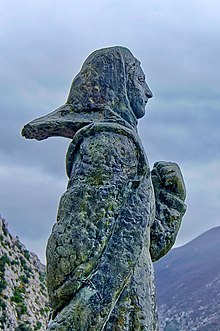

Mila Gojsalić (also traditionally "Mile Gojsalića") (died 1530) is a Croatian legendary folk heroine from small region of Poljica, situated between Split and Omiš in present-day Croatia.


According to tradition, her origins are from the village of Kostanje [hr] in the Dalmatian hinterland, and allegedly she was a distant descendant of Croatian king Gojslav.[1] The legend started evolving around time of the Ottoman wars in Croatia, and it is possibly modeled on that Marulić's fictional heroine Judita herself.[1] The basic narrative revolves around the legendary battle, placed in 1530, and the tale of Ottoman commander, Ahmed-pasha, who allegedly gathered an army of 10 000 men with a goal to conquer Poljica, while setting up a camp in a place called Podgrac (modern Podgrađe [hr]). Mila Gojsalić went on to sacrifice herself and lose her virginity to the Ahmed-pasha in order to be able to infiltrate the Turkish camp and blow up the munitions stockpile, killing Ahmed-pasha and numerous officers and soldiers.
Ivan Meštrović sculptured the statue of her, installed above the town of Omiš, while Jakov Gotovac composed the opera to her honour. August Šenoa also wrote about her. In her birthplace, every summer there is a cultural manifestation called The days of Mila Gojsalić. Her house is still in the village and is completely renewed.
This Croatian biographical article is a stub. You can help Wikipedia by expanding it. |